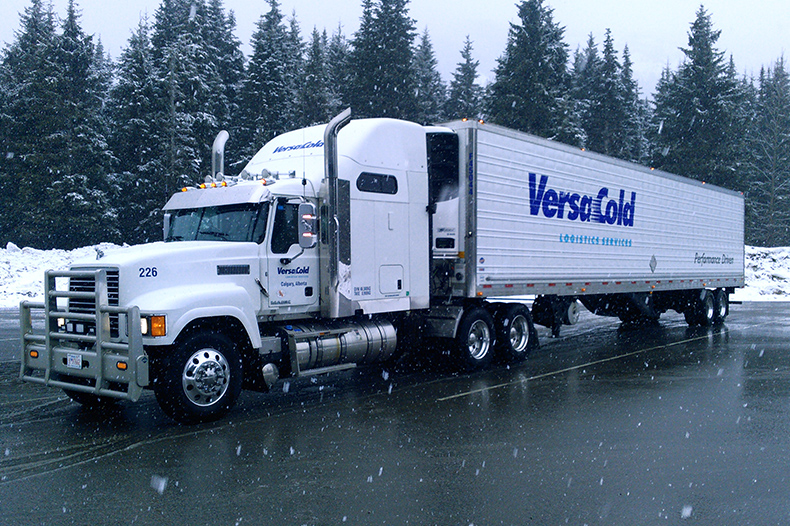Winter truck driving tips from a driver with 5 million safe miles
With hundreds of trucks on the road moving millions of pounds of food every week, drivers at VersaCold experience the daily challenge of safely delivering food that consumers enjoy. And the safe delivery of food becomes more of a challenge in the winter months. Despite difficult weather conditions, our commitment to both safety and customer satisfaction doesn’t change—so we rely on talented drivers to safely move the food that families love to eat.
To understand how drivers prepare for winter driving, we spoke with one of our most experienced drivers, Steve Nickason. Steve, who is based out of the Calgary area, has been driving professionally for over 42 years and has avoided collisions in the 5-million-plus miles he’s travelled. We asked Steve to share a few ways he takes caution when driving in the winter.
Park in a warm garage
When available, always try to park your tractor in an enclosed, heated garage. This protects your truck from being exposed to the harsh winter elements. It also allows fluids and other components to maintain a steadier temperature, meaning the truck is better prepared when it’s time to hit the road. While Nickason notes that a heated space is not always feasible for every driver, always take advantage of it when you can.
Grease the fifth wheel
It is especially important to keep your fifth wheel greased during the winter months because it allows the trailer to smoothly pivot with the tractor. During winter, road conditions can change quickly, requiring drivers and their equipment to smoothly adjust. In the event of a sudden movement, a fifth wheel that is not properly greased can lock to the trailer, causing it to push the truck off the road. Always ensure your fifth wheel is properly lubricated and well maintained, so that the truck and trailer can safely work in tandem.
Check that the fifth wheel locks
During winter months, roads are regularly covered in sand, salt and brine. Although this helps make road surfaces less slippery, particulates and liquids can get onto exposed truck parts, potentially reducing their effectiveness. According to Nickason, it’s especially dangerous when particulates get into the locking mechanism because it prevents it from closing properly. Don’t just assume that a solid connection has been made. After you hook up, visually inspect to ensure the truck and trailer are connected.
Ensure all wheels are rotating
Before you leave, check that all tires on both the truck and trailer are rotating. An ideal time to check this is when picking up a new load at a dock. Nickason notes that when getting a new load, drivers often pull the trailer forward a few feet to close the doors. This is a good time to take an extra minute to check that there’s snow on all tire treads, confirming that the wheels are properly rotating. And don’t forget to check that the brakes aren’t frozen.
Leave early
To give yourself plenty of time to arrive at your destination, Nickason encourages drivers to pick up new loads as soon as they’re ready. “You never know what’s going to happen out there,” says Nickason. “There’s always the risk of traffic, but adverse weather conditions can cause even slower driving conditions.” By allowing maximum time, drivers can avoid feeling a need to rush and can safely arrive at their destination.
Ensure exposed wiring and hoses are free of ice
On the road, ice buildup can weigh down exposed hoses, causing breakage that can lead to loss of braking ability—a critical factor, especially during winter months. Nickason recommends that you regularly check the exposed wires and hoses and remove excessive buildup. This will relieve undue pressure and better ensure the safe operation of the equipment through to your destination.
Check tires and lights
Temperatures and weather conditions can change significantly during the course of a day. This can result in changes in tire pressure and cause added buildup of ice and snow on wheels and other parts of your vehicle. Because of this, Nickason suggests that you keep an especially keen eye on your vehicle during the winter. This means always doing a circle check on your truck to frequently observe the tire pressure, clear excess moisture and ensure that lights are fully visible.
Nickason humbly attributes his 5-million-mile accident-free driving record to “a bit of luck.” But after speaking with him, it’s obvious that his pride in safely delivering the food Canadians eat motivates him to practice road safety all year long—especially during the winter. It’s because of people like Steve that VersaCold customers can be confident that their products are in good hands.
If, like Steve, you share a passion for driving and a commitment to safety, click here to learn about driving opportunities at VersaCold Logistics Services.
If you are interested in learning more about VersaCold and our services, click here or reach out to our sales team at sales@versacold.com.











